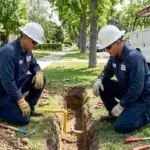Secure your property with locksmith services by choosing licensed professionals who can upgrade your locks, rekey existing systems, and provide expert security assessments. Professional locksmiths help protect your home through proper installation of high-quality locks, security audits, and guidance on both traditional and smart lock options, with the U.S. locksmith industry projected to reach $3 billion in 2025 . Modern security professionals integrate biometric systems and access control technology alongside traditional mechanical solutions.
Secure Your Property with Locksmith
Professional locksmith services transform your property’s security from basic protection to comprehensive defense. Licensed locksmiths do more than fix broken locks—they assess your entire security setup and recommend improvements, with 2025 trends showing increased demand for multi-layered security systems in both residential and commercial sectors .
Home security starts with understanding your weak points and fixing them systematically. A qualified locksmith examines your doors, windows, and entry points to identify vulnerabilities you might miss. They can spot outdated locks, improperly installed hardware, and potential security gaps that criminals often exploit. These professionals also stay current with the latest security threats and can recommend modern solutions including biometric authentication locks that use unique physical attributes like fingerprints or facial recognition for keyless entry systems . Many homeowners don’t realize that basic lock rekeying after moving into a new home costs far less than replacing all the hardware, yet provides immediate security improvements. The trustworthiness of professional locksmiths becomes paramount when they’re entrusted with your property protection.
Common Security Weaknesses and How Locksmiths Fix Them
Weak locks, stolen keys, and vulnerable entry points create easy targets for burglars. Professional locksmiths fix these problems through proper installation, upgrades, and strategic improvements that safeguard your property defense.
Most home break-ins happen because of preventable security flaws that homeowners overlook. Old or damaged locks often fail under minimal pressure, while improperly installed deadbolts leave gaps that criminals can exploit with simple tools. Locksmith scams have become more sophisticated, with Google removing over 10,000 fraudulent business listings in 2025 alone , making it crucial to verify credentials before hiring anyone. Lost or stolen keys pose immediate risks since you don’t know who might have copies or access to your property. Professional locksmiths address these issues by installing anti-bump locks, reinforcing door frames with longer screws, and rekeying locks to ensure old keys no longer work. The key concept here involves both the physical object and the important element of maintaining secure access.
Physical attacks like lock bumping, snapping, and drilling have become more common as criminals learn these techniques online. Licensed locksmiths install specialized hardware designed to resist these attacks, including reinforced strike plates and lock cylinders with tamper-evident features. They also check for signs of attempted break-ins that homeowners might miss, such as scratches around keyholes or damaged door frames. Modern security systems now incorporate pick-resistant mechanisms that provide enhanced reliability against manipulation attempts.
Choosing the Right Locksmith: Licensing, Trust, and Expertise
Only 13 states currently require licensed locksmith credentials as of January 2025: Alabama, California, Connecticut, Illinois, Louisiana, Maryland, Nevada, New Jersey, North Carolina, Oklahoma, Oregon, Texas, and Virginia , making verification essential before hiring anyone. Look for proper identification, business licenses, and transparent pricing to avoid scams.
Locksmith scams target vulnerable situations when people need help quickly, often quoting low prices then dramatically increasing costs after arrival. Legitimate locksmiths typically charge at least $60 for service calls, while scammers often quote unrealistic prices between $15 and $40 to bait customers . Professional locksmiths arrive in marked vehicles with company logos, carry proper identification including license numbers where required, and ask for your identification to verify you own the property they’re unlocking . Illinois plans to terminate its locksmith licensing requirements in 2029, showing the changing regulatory landscape . The historical etymology of “lock” traces back to Old English “locc,” reflecting the ancient need for security that continues today.
Verify credentials by checking state licensing databases where available and researching companies through multiple review platforms. Avoid businesses that only use 800 numbers instead of local phone numbers, as these often connect to out-of-state call centers. Ask for written estimates before work begins and be wary of anyone who insists on drilling or replacing locks without first attempting to pick them, as this suggests inexperience or fraudulent intent. The durability of their reputation often reflects their professional competency.
Smart vs. Traditional Locks: What Works Best for You
Smart locks offer convenience through keyless entry and remote access, but they introduce digital vulnerabilities that traditional locks don’t have. The best choice depends on your technical comfort level and security priorities, with 2025 trends showing increasing adoption of biometric locks and AI-powered security systems that integrate fingerprint scanning, facial recognition, and voice authentication .
Smart locks connect to Wi-Fi or Bluetooth networks, making them vulnerable to hacking attempts if not properly secured with strong encryption and regular firmware updates . Recent vulnerabilities include the Chirp Systems app flaw rated 9.1/10 severity that could allow unauthorized remote control, and hard-coded credentials in some smart locks affecting an estimated 50,000 homes . These digital risks require ongoing maintenance through software updates and strong passwords that many homeowners neglect. However, reputable smart lock brands implement robust AES encryption, two-factor authentication, and regular firmware updates to mitigate hacking risks . Smart locks excel in convenience, allowing you to grant temporary access to visitors, monitor entry logs, and integrate with other home security systems.
Traditional locks remain more reliable for basic security since they can’t be hacked remotely and don’t depend on batteries or internet connections. High-quality deadbolts with reinforced strikes and anti-bump locks provide excellent physical security without digital vulnerabilities. The combination approach works well for many homeowners—using traditional locks as primary security with smart features as convenient additions rather than replacements. This represents the contrast between technological advancement and proven mechanical reliability.
Smart Lock Vulnerabilities
Smart locks face risks from remote hacking, key fob cloning, and man-in-the-middle attacks that can compromise your home’s security . Research shows smart locks using Bluetooth without proper encryption are vulnerable to attacks that can result in unauthorized access . Biometric locks add another layer of complexity with potential insecurity if not properly configured.
Traditional Lock Enhancements
Upgraded traditional locks with anti-bump locks, reinforced strike plates, and Grade 1 deadbolts provide superior physical security. These mechanical improvements resist common attack methods like bumping, drilling, and forced entry without requiring ongoing software maintenance. The key pins within quality cylinders offer enhanced resistance to picking attempts.
Enhancing Security Through Layers: Beyond the Lock
Comprehensive property protection combines multiple defensive layers including lighting, landscaping, window security, and community awareness. Professional locksmiths help coordinate these elements for maximum protection, with 2025 trends showing integration of AI-powered threat detection systems that learn from data patterns to alert homeowners about potential security breaches before they occur.
Your lock is just one part of effective home security—criminals often target easier entry points like windows, sliding doors, or poorly lit areas around your property. Professional locksmiths conduct security audits that examine your entire property, not just door locks, to identify vulnerabilities and recommend improvements. Window locks, sliding door security bars, and motion-activated lighting create multiple obstacles that deter most criminals who prefer quick, unnoticed entry. Proper landscaping eliminates hiding spots near entry points while maintaining clear sightlines for neighbors and security cameras. Neighborhood watch programs amplify individual security efforts by creating community awareness and faster response to suspicious activity.
Simple upgrades like longer screws in door hinges, reinforced door frames, and upgraded lighting often provide better security improvements per dollar spent than expensive electronic systems. Professional locksmiths understand how these elements work together and can prioritize improvements based on your specific property layout, budget, and risk factors. They also coordinate with alarm system installers and security camera technicians to ensure all components work together effectively rather than creating conflicting systems. Modern access control systems can integrate biometric safes and vaults for high-value assets, adding extra layers to your comprehensive home security system.
The layered approach means that even if criminals defeat one security measure, they face additional obstacles that increase their risk of detection and capture. This comprehensive strategy provides better overall protection than relying solely on locks, no matter how advanced or expensive they might be. The polysemy of “security” encompasses both the physical systems and the peace of mind they provide.
Key takeaway: Effective property security requires professional assessment, proper installation, and layered defenses that work together. Choose licensed locksmiths who understand both traditional and modern security technologies, verify their credentials carefully, and implement multiple security layers for comprehensive protection that transforms potential vulnerability into robust defense.





